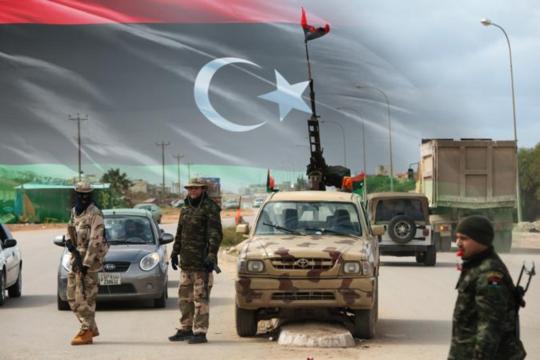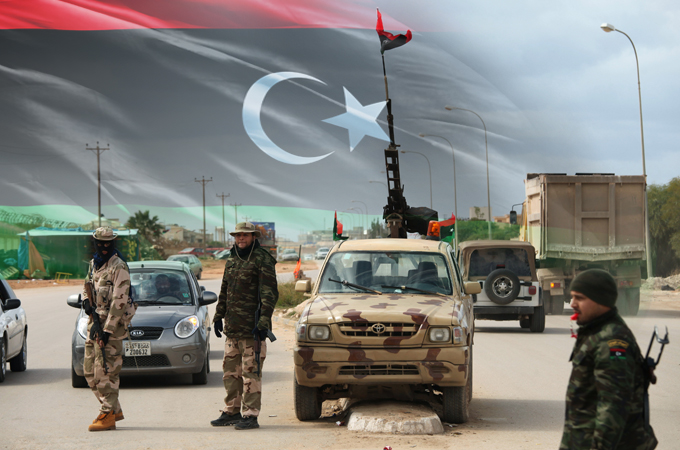
 |
| [AlJazeera]
|
| Abstract The security situation in Libya continues to deteriorate despite a steady growth in state security forces. Ongoing bombings, assassinations, kidnappings and smuggling are seen as a failure of the state authority and have prompted retired General Khalifa Haftar to call for the toppling of the General National Congress (GNC) and Libyan government. There was limited popular or military and armed factions support for this call; however, there has been some public sentiment calling for a strong military figure to contain disorder. They are opposed by Libyans who hold reservations about change by force. Haftar’s call, then, serves to extend regional trends and complicate the containment of federalism. It is also further consolidation of competition between figureheads occurring undemocratically and external to electoral processes. |
Introduction: Deteriorating security
Despite a steady growth in national security forces introduced by Libya’s Ministry of the Interior, there has been severe deterioration in the country’s security, including bombings, assassinations, kidnappings and smuggling. This is aside from extensive clashes between tribes and regions, especially in the country’s western and southern quarters. According to the General National Congress’ (GNC) National Security Committee report, there are more than 200,000 employees of the Ministry of the Interior, including more than 130,000 commissioned and non-commissioned officers. Despite all of this, there are no clear signs of security presence and policemen argue they cannot execute arrest warrants or confront suspects due to the proliferation of arms in the country.
The security situation in Libya creates a perpetual circle of political instability. Internal conflict is high, with some parties using armed factions to weaken the state authority they perceive as a threat to their interests, while other parties that stand to benefit from a stronger state oscillate between building up the state’s armed forces and using armed factions to implement their decisions. The assassination of a number of policemen and soldiers on the night of February 26, 2014 sparked a protest in Benghazi calling for the formation of a committee to protect their city – a fully-financed committee that would have authority over police and other security forces.
The state’s inability to ensure security, the growth of armed groups that gained legitimacy from their participation in the revolution against Gadhafi, the lack of sufficient legitimate and elected political leadership to implement the state’s authority and growing calls for the kind of regional autonomy that existed in the past have made it possible for some forces to refuse recognition of the state – even going to so far as to call for the use of force against the state if necessary. Retired General Khalifa Haftar’s call to overthrow the GNC has been the most prominent example of such developments.
Change by force
Many concerned about Libyan affairs have commented on the severe polarisation caused by the general’s call. The divide is clear between those who saw it as a revolutionary attempt against the legitimate regime, and his supporters, who claimed Haftar offered a political initiative to emerge from the deadlock at the end the GNC’s mandate.
Haftar’s movement depends on military force to overthrow an elected and legitimate regime and establish a new regime based on armed forces, bearing some resemblance to a military coup. Haftar has rejected this characterisation, and on various occasions has used the terms “course correction,” and, on television, “an initiative” to address the critical situation. This is typical of proponents of military change who are unlikely to use the term coup because they describe their actions as a response to the will and demands of the people.
On the other hand, the appearance of Haftar delivering a statement in his military uniform on Al Arabiya TV channel on the morning of February 7, 2014 brought to mind the recent leading role played by General Abdul Fattah El-Sisi in the Egyptian coup. Breaking news revealed Haftar’s troops had control of vital sites in Libya’s capital, Tripoli. This information that was not denied by Haftar in any of his following statements and confirms that Haftar is operating from a revolutionary starting point.
Haftar’s statement emphasised the end of the role of the GNC and the Libyan government and the freezing of the constitution, yet another indicator of change by force. The statement’s content showed consistency with steps followed by military coups. It is well-known that the first move of revolutionary movements is to abolish existing authority and the constitutional basis from which it derives its legitimacy.
In a later interview with Free Libya TV, Haftar denied that his scheme was a coup, but he confirmed that he was in contact with soldiers, rebels and tribal components, and that he and his supporters were ready to protect the people in case they decided to overthrow the Congress.
Haftar’s communications across Libya indicate he had wagered on a broad popular movement on February 7, 2014, similar to the scenario with Sisi in Egypt, with Haftar and his supporters as its military arm. The broad popular movement would then become the deterring force against armed entities supporting the GNC and rejecting the “No to Extension” demonstrations. Haftar has publicly connected his role and the will of people, and said, “The ball is now in the range of our people. We are waiting for their response to us and we are ready.”
Despite evident tensions between the GNC, the joint chiefs of staff and the prime minister, all of them have strongly rejected Haftar’s call and consider it a coup attempt, prompting the prime minister and chief of staff to issue a warrant for his arrest.
Bridges and cracks
It is clear that Haftar’s call to overthrow the GNC and the Libyan government has not received popular response. In addition, support from officers and armed groups remains limited and confined to modest numbers in the eastern and western quarters of the country. Even with increasing public sentiment that a strong military personality is required to control the security situation in Libya, recent celebrations during the revolution’s anniversary showed popular attachment to its democratic premises and popular rejection of change by force, particularly by someone who was sharply criticised for his role in the civil war in Chad. Haftar was also one of the officers who helped Gadhafi gain access to power. However, continued political confusion, increasing polarisation and discontent with the performance of current leadership may give Haftar’s move some momentum, particularly in view of the wave of rejection against the GNC by a section of the elite and rebels.
It is worth noting that the eastern region’s position may be fuelled by Haftar’s move. Haftar’s reliance on this dimension was made clear in his speech before those who gathered in front of his house on February 28, 2014, when he threatened to arrest members of the GNC and the prime minister if they arrived at any of the airports in the eastern region.
The impact of Haftar’s move was also clearly manifested in the antagonism between the two political camps represented by the National Forces Alliance and Justice and Development Party. On the one hand, the chairman of the Justice and Development party, Mohamed Sowan, described Haftar’s statement as an attempted coup because Haftar announced the cancellation of legitimate institutions. On the other hand, the chairman of the Steering Committee of the National Forces Alliance, Abdul Majid Milaiqtah, considered what Haftar offered as a vision put forward by one of the country’s parties. These opposing positions have aggravated polarisation and weakened efforts to contain Haftar.
There are indications Haftar’s move may consolidate struggles and competition for symbols of influence outside the circle of the democratic process and its electoral mechanisms, a factor that will increase challenges and contribute to the obstruction of the transitional period.
It is not expected that repercussions of Haftar’s move will constitute a direct and strong threat to the GNC and the government, or to Libyan political processes. However, similar moves to turn away from the state’s authority could take place, such as recent attempts of some armed factions to export oil without permission from the Libyan government. These moves fall within the context the reliance of some powers on arms rather than elections to achieve their interests. However, the Libyan state is persistent in its efforts to impose its authority. Prime Minister Ali Zeidan, ousted by the GNC on March 11, 2014 through a vote of no-confidence, arrived in Benghazi just two days after Haftar’s threats without being exposed to any harm. The election of the constituent body of the Libyan constitution, a major factor in the transitional road map, is an additional victory for the state. Undoubtedly, it is a success in consolidating the legitimacy of elections without resorting to arms. It is also evidence that the emerging Libyan state has managed, despite its weakness, to overcome the forces that want to overthrow it.